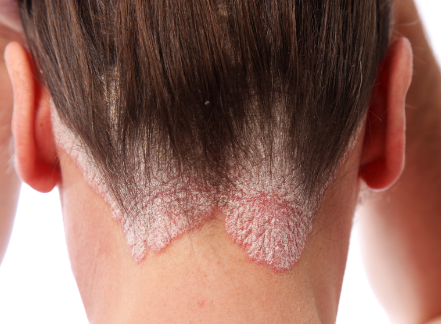Psoriasis

Understanding Psoriasis: Causes, Symptoms, and Treatments
Introduction
Psoriasis is a chronic autoimmune skin condition that causes rapid skin cell turnover, leading to the buildup of cells on the skin's surface. This results in scaly, red patches that can be itchy and painful. Psoriasis is a long-term condition that can come and go in cycles, often triggered by certain environmental or internal factors.
Causes of Psoriasis
- Immune System Dysfunction:
- Autoimmune Disorder: Psoriasis is caused by an overactive immune system that mistakenly attacks healthy skin cells, causing inflammation and rapid cell turnover.
- Genetics:
- Family History: Psoriasis tends to run in families, and individuals with a family history of the condition are more likely to develop it.
- Triggers:
- Infections: Strep throat and other infections can trigger psoriasis flare-ups.
- Stress: Emotional or physical stress can worsen psoriasis symptoms.
- Injury to the Skin: Scrapes, cuts, or sunburn can trigger new patches of psoriasis (Koebner phenomenon).
- Medications: Certain medications, such as beta-blockers, lithium, and some antimalarial drugs, can trigger or exacerbate psoriasis.
- Weather: Cold, dry weather can make symptoms worse, while warm, sunny climates may improve them.
Symptoms of Psoriasis
- Red Patches of Skin: These patches are often covered with silvery scales, most commonly appearing on the elbows, knees, scalp, and lower back.
- Itching or Burning: The affected areas can become itchy, sore, or even painful.
- Dry, Cracked Skin: The skin may crack and bleed in severe cases.
- Thickened or Pitted Nails: Psoriasis can also affect the nails, causing them to become thick, discolored, or develop pits.
- Joint Pain: In some cases, psoriasis is associated with psoriatic arthritis, causing swelling, pain, and stiffness in the joints.
Types of Psoriasis
- Plaque Psoriasis (Most Common): Characterized by raised, red patches covered with a silvery-white buildup of dead skin cells.
- Guttate Psoriasis: Small, drop-shaped lesions on the skin, usually triggered by infections like strep throat.
- Inverse Psoriasis: Red, inflamed patches occur in skin folds, such as under the breasts, in the groin, or around the genitals.
- Pustular Psoriasis: White pustules surrounded by red skin, often affecting the hands and feet.
- Erythrodermic Psoriasis (Rare): A severe form that causes widespread redness and peeling of the skin, resembling a severe burn.
Home Remedies and Lifestyle Changes for Psoriasis
- Moisturize Regularly:
- Keep Skin Hydrated: Use thick creams or ointments to lock in moisture and reduce dryness and scaling.
- Use Aloe Vera:
- Soothing Agent: Aloe vera gel may help reduce redness, itching, and scaling.
- Take Baths:
- Soak in Lukewarm Water: Adding Epsom salts, oatmeal, or Dead Sea salts to the bath can help soothe inflamed skin.
- Avoid Triggers:
- Manage Stress: Practice relaxation techniques like meditation, yoga, or deep breathing to lower stress levels.
- Protect Skin: Avoid skin injuries and sunburn, and manage any infections promptly.
- Dietary Adjustments:
- Anti-Inflammatory Foods: Consuming omega-3-rich foods like salmon, flaxseeds, and walnuts can reduce inflammation. Also, include fruits, vegetables, and whole grains while avoiding processed foods and sugars.
- Sunlight Exposure:
- UV Light Therapy: Moderate exposure to natural sunlight can help reduce symptoms. However, it’s important to avoid overexposure to prevent sunburn.
Clinical Treatments for Psoriasis
- Topical Treatments:
- Corticosteroids: Prescription-strength creams and ointments can reduce inflammation and slow cell turnover.
- Vitamin D Analogues: These topical treatments slow skin cell growth and are often used in combination with corticosteroids.
- Coal Tar: This traditional treatment helps reduce scaling, itching, and inflammation.
- Phototherapy:
- UV Light Therapy: Controlled exposure to ultraviolet light (UVB) can help reduce symptoms of psoriasis, slowing the growth of skin cells. This treatment is often administered in a clinical setting.
- Systemic Medications:
- Oral Medications: For moderate to severe psoriasis, oral medications like methotrexate, cyclosporine, or retinoids may be prescribed to reduce inflammation and slow the immune system’s response.
- Biologics: These newer treatments target specific parts of the immune system to help reduce inflammation and are often used in severe cases. Examples include adalimumab (Humira) and infliximab (Remicade).
- Injectable Treatments:
- Biologic Agents: Injectable biologics are used to block immune system signals that contribute to psoriasis. These medications are often prescribed for more severe forms of psoriasis and psoriatic arthritis.
- Oral Retinoids:
- Synthetic Vitamin A Derivatives: These can reduce cell production in the skin, but side effects may include dry lips and hair loss.
Alternative/Non-Invasive Treatments for Psoriasis
For psoriasis, the therapies offered by Earl Claytont Wellness Centre that may help manage symptoms and support skin health include:
- Full Spectrum Infrared Sauna:
- Infrared saunas can promote detoxification and improve circulation, which may help reduce inflammation and ease the symptoms of psoriasis. The warmth also soothes skin discomfort and can improve overall skin texture.
- PEMF (Pulsed Electromagnetic Field Therapy):
- PEMF therapy may help reduce inflammation and support skin healing by improving circulation and cellular regeneration. This can be beneficial for managing the skin plaques and irritation caused by psoriasis.
- Vitamin B Complex:
- B vitamins, particularly B12 and B9 (folate), play a role in skin health and immune function. Supplementing with a B Complex can help improve skin resilience and reduce the severity of psoriasis flare-ups.
- NAD+ Therapy:
- NAD+ therapy supports cellular repair and regeneration, which can help improve skin health and reduce oxidative stress. It may be beneficial for managing psoriasis by promoting overall skin repair and reducing inflammation.
These therapies can help manage the symptoms of psoriasis by reducing inflammation, promoting skin regeneration, and supporting immune and skin health.
Discover the perfect treatment for you with a FREE MEDICAL ASSESSMENT! Limited slots available – secure yours now by scheduling an appointment. Click below to book now!
When to Seek Medical Attention
- If psoriasis covers large areas of the body, causes joint pain, or if over-the-counter treatments are ineffective, it’s important to consult a healthcare provider. They can recommend the best course of treatment based on the severity of the condition.
Conclusion
Psoriasis is a lifelong condition, but with the right combination of treatments, including home care and clinical options, its symptoms can be effectively managed. Regular consultation with a healthcare provider is crucial to determine the most appropriate treatment plan for each individual. Avoiding triggers, adopting healthy habits, and seeking professional care when necessary can help minimize the impact of psoriasis on daily life.

